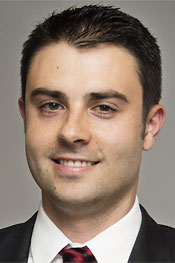Professor Maureen “Molly” Brady of the University of Virginia School of Law has been named co-winner of the 2019 Scholarly Papers Competition sponsored by the Association of American Law Schools.
Her paper, “The Forgotten History of Metes and Bounds,” forthcoming in the Yale Law Journal, explores the social and legal context surrounding earlier metes and bounds systems and the important role that nonstandardized property can play in stimulating growth. Metes and bounds is a method of describing land or real estate that uses physical features of the local geography, along with directions and distances, to define and describe boundaries.
Alumnus James Nelson ’09, an assistant professor of law at the University of Houston Law Center, also won for his paper, “Corporate Disestablishment,” forthcoming in the Virginia Law Review. He spoke on the topic at the Law School in February.

The competition, in its 34th year, is open to law faculty who have been teaching for five years or fewer. There were 55 entries this year.
The award will be presented in January during the AALS Annual Meeting in New Orleans. As winners, Brady and Nelson were invited to serve on the Scholarly Papers selection committee in 2020.
Brady joined the faculty as an associate professor of law in 2016. Her primary teaching and research interests are in property law, land use law, local government law, legal history and intellectual property law. Her scholarship undertakes historical analyses of legal rules and land use policies, using these analyses to account for developments in eminent domain law, to illuminate connections between property and other doctrinal areas, and to explore how different institutions respond to problems in city planning and governance.
Founded in 1819, the University of Virginia School of Law is the second-oldest continuously operating law school in the nation. Consistently ranked among the top law schools, Virginia is a world-renowned training ground for distinguished lawyers and public servants, instilling in them a commitment to leadership, integrity and community service.


